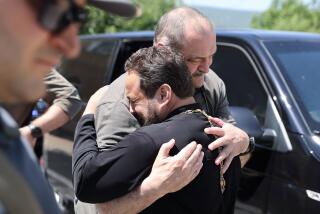A Brutal Heel on Chechnya
- Share via
Islamic militants from Chechnya do pose a security problem for Russia; they have carried out multiple kidnappings and armed intrusions into neighboring Dagestan and stand accused of murderous bombings inside Russia. But Moscow’s military revenge is unjustifiably murderous, claiming the lives of hundreds of civilians and driving huge numbers of the Chechen people out of their homes. The assault on Chechnya violates a number of Russia’s treaty obligations. The international community, especially Russia’s partners in the Organization for Security and Cooperation in Europe (OSCE), should hold Moscow accountable.
A rash of terrorist bombings in and around Moscow last summer in which some 300 people were killed drew international sympathy. Then, six weeks ago, the world watched silently as the Russian military, cheered by the population, pounced on Chechnya. But the indiscriminate bombing of Chechen villages has turned into an ethnic cleansing, and the world should no longer remain silent.
Russian Prime Minister Vladimir V. Putin, while acknowledging that the conflict with Chechnya cannot be resolved militarily, has turned down Chechen President Aslan Maskhadov’s appeal to negotiate. Russian generals, humiliated in the 1994-96 war with Chechnya, have no interest in negotiating.
Putin has acknowledged that the concentration of Russian armaments in the northern Caucasus is a violation of the treaty on conventional forces in Europe, which limits the armor that Russia can deploy near its borders. The bombing of civilian targets also violates the OSCE code of conduct, which Moscow signed in 1994, binding it to seek a negotiated solution to internal and external armed conflict and take “due care” to avoid injury to civilians. The Clinton White House, in a belated but welcome expression of ire, Monday accused Moscow of not meeting the Geneva conventions.
Pressure against Russia’s policy will not come from within. The war is popular so far, and media coverage gives little indication of the extent of suffering it is causing.
Demands for Russia to stop the attacks and negotiate must come from the outside, particularly the OSCE, which Moscow respects and considers a potential replacement for NATO in Europe. The crisis in Chechnya should top the agenda for the OSCE summit Nov. 18 and 19 in Istanbul, Turkey. The 54 OSCE members, the United States among them, must make it clear to Moscow that Chechen terrorism, actual or alleged, does not justify the torment of the entire Chechen people.
More to Read
Sign up for Essential California
The most important California stories and recommendations in your inbox every morning.
You may occasionally receive promotional content from the Los Angeles Times.













